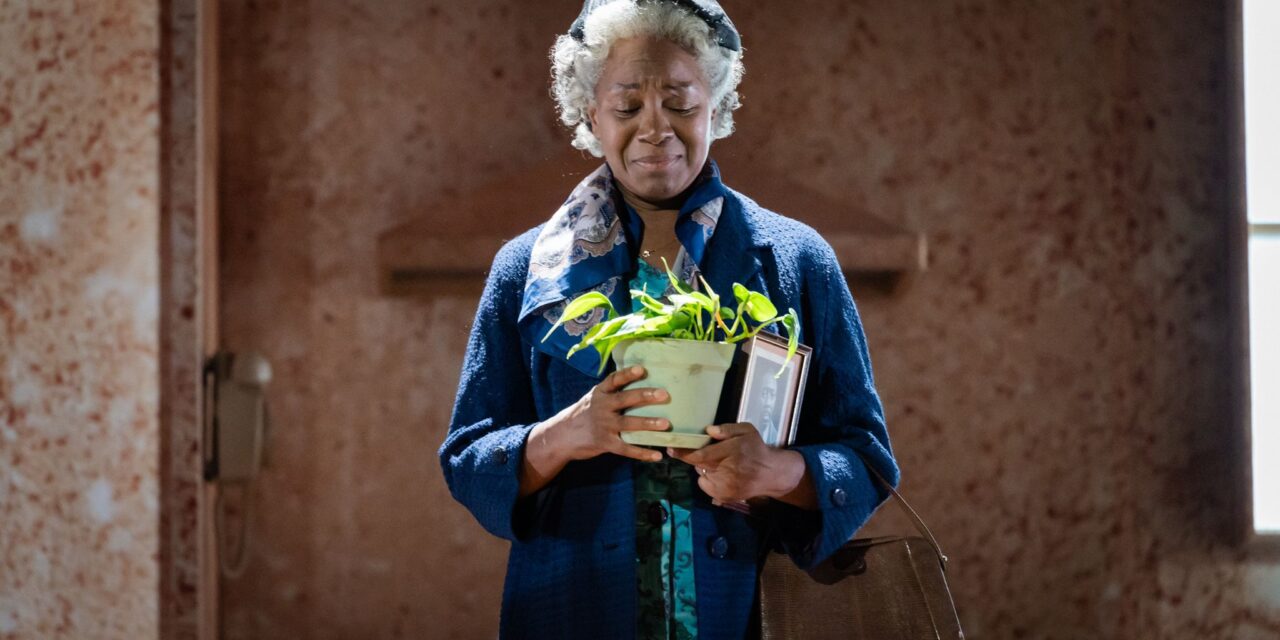
2 – 5 October
The premiere of A Raisin in the Sun in New York in 1959 was a ground-breaking event. Author Lorraine Hansberry was the first Black woman to take an original script all the way to Broadway and the cast of the drama was almost completely Black. The quality of the drama was immediately apparent. It won the Drama Critics’ Circle Award for that season and transformed Hansberry, who was only 29, into a celebrity. Rising film star Sidney Poitier played the key role of Walter Lee Younger.
The continued resonance of the play is indicated by its frequent revivals and this latest version – a coproduction from Headlong, the Leeds Playhouse, Lyric Hammersmith and Nottingham Playhouse – is an honourable addition to the line of succession.
Part of the original novelty of A Raisin in the Sun was that it introduced early (and largely white) audiences to the details of Black life, and specifically to the daily scrabble for existence in a ghetto area of Chicago. Details of that life would have been unfamiliar to the cushioned patrons of Broadway but in some respects they weren’t so far from the experiences of any side-lined, struggling group across the country. And the wider concerns of the play – family dynamics and tensions, anxiety about status, questions of heritage – are universal.
The title is explained by a verse epigraph to the play: ‘What happens to a dream deferred?/Does it dry up/Like a raisin in the sun?’ Almost all of the characters are inspired or haunted by dreams of how their lives might be different and better.
The five members of the Younger family live in a rented apartment in Chicago. Widowed Lena is mother to college-age Beneatha, who wants to be a doctor, and to 35-year-old Walter Lee, who chafes at his menial job as a chauffeur. Sharing the cramped space are Ruth, Walter’s wife, and their young son, Travis. The whole family is waiting for the arrival of a $10,000 cheque, a life insurance payment on Lena’s late husband.
Moma Lena, in a quietly assured performance from Doreene Blackstock, is ambivalent about the money since it is essentially recompense for her husband’s death. Perhaps it can be put to good use, though, as a down payment on a house in a more salubrious – ie, white – area of town. Her desire to escape the ghetto is shared by daughter-in-law Ruth, played with a fetching mixture of vulnerability and resilience by Cash Holland. Walter Lee, volatile and assertive in the performance of Solomon Israel, has vaguer, more deluded ambitions. He wants to invest the cash in a liquor store and dreams of a life where he can be the boss. There is love between him and his mother but also tension. Who is the real head of the household here? His sister Beneatha (Josephine-Fransilja Brookman) is feisty and self-centred but there is a thread of altruism in her. Mention should also be made of the confident turn provided by 14-year-old Jayden Dias as young Travis.
Other characters include two would-be suitors of Beneatha. George (Gilbert Kyem Jnr) offers an entree into the world of the affluent, black middle-class while Joseph (Kenneth Ornole) tries to entice her to accompany him to Nigeria to reclaim a way of life which she has never known and which she suspects he is romanticising. The only white character in A Raisin in the Sun is Karl (Jonah Russell), an emissary from the suburban community where the family is planning to move. He denies ‘race prejudice’ but believes that people get on better when they ‘share a common background’. Using a mixture of soft threats and outright bribery, he offers the Youngers money not to move in.
There is more, much more, to A Raisin in the Sun than the question of whether the family’s dreams, any of them, will be realised or even come close to being realised, but the suspense and uncertainty provide narrative fuel to the drama. Director Tinuke Craig has choreographed an accomplished cast who illuminate a historical moment, decades ago, in a particular city but who also bring to affecting life the universal elements which underpin this special Black family.
★★★★☆ Philip Gooden 3rd October 2024
Photo credit: Ikin Yum


